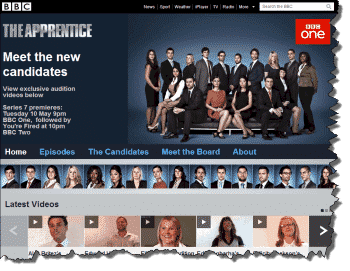Lord Sugar is back on British TV screens tonight in the much-heralded return of “The Apprentice” – the programme which supposedly selects one of the best young business brains in the country. All across the UK tonight people will be glued to their TV sets to get their first glimpse of the “talent” on offer. Equally, there will be people who can’t abide the show and will turn to some alternative activity at 9pm. However, there is a chance that many of those people who reckon they detest the programme will be doing so based on a lie. They may well believe they have actually watched previous editions of The Apprentice and made a judgement as a result. But in fact, these people will never have watched Lord Sugar in action. Often you find critics of some TV show who are vocal with their opinions, only to find later that they have never actually watched the programme they are critical of.
 These people may have developed “false memories” – their brain convinces them they have actually experienced something, when they haven’t. False memory is a really difficult concept to study because the people who have the false memories believe what they recall is actually true. However, an interesting new study about to be published in the Journal of Consumer Research shows two things – firstly how such false memories can be established and secondly what that means for your use of the Internet.
These people may have developed “false memories” – their brain convinces them they have actually experienced something, when they haven’t. False memory is a really difficult concept to study because the people who have the false memories believe what they recall is actually true. However, an interesting new study about to be published in the Journal of Consumer Research shows two things – firstly how such false memories can be established and secondly what that means for your use of the Internet.
The researchers worked with three groups of people. One group were shown a low-level advert for some fictitious pop-corn. A second group were shown some vivid, high imagery advertising for the same fake product. A third group ate some pop-corn, having been told it was the fictitious brand. At a later date, the participants were questioned about the fake popcorn. Those who saw the low- level advertising did not believe they had ever tried it. But the people who saw the vivid advertising believed they had actually tasted the pop-corn – even though no such pop-corn exists and even though they had never been given any of it. These participants were just as likely to believe they had tasted the pop-corn as the group of individuals who had actually eaten some, believing it to be the new brand.
In other words, brilliant imagery created a false memory in people, making them believe they had experienced something, when in fact they hadn’t. That might explain the nay-sayers for The Apprentice – it has “signature” imagery of flights across the London skyline and travels in a Rolls Royce (along seemingly empty London roads). These vivid picture might make people believe they have watched the programme, when in fact they haven’t.
Online this all has important implications. It means that the vivid images of some web products can make you believe you have experienced them in some way beforehand. That can obviously make it more likely you will want to buy them or engage with them, because the vivid imagery will have helped build up false memories in your brain. However, there is an added aspect of the pop-corn study which comes hot on the heels of yesterday’s article on the frequency of website updates. The researchers found that the less people were exposed to the vivid imagery, the less likely it was that they believed they had experienced the product.
What this tells us is – once again – that the more you are “in the face” of your potential audience, the more they remember about you and what you have to offer. But equally it means that the more an online service is shown to you, with vivid images that aid recall, the more you are likely to believe in it – even if you have no experience of it. This research suggests that if you use vivid imagery in your online presence you can connect with your audience more deeply than if you use simple images. Indeed, advertisers on Google AdWords frequently report greater click throughs on image adverts compared with text-based ones.
But at the same time as realising you can create greater psychological connections with your audiences with the appropriate use of images, perhaps you need to take a deep breath when using the web as some unscrupulous advertisers may, effectively, be lying to you. So, it might be an idea to reduce your frequency of connection with some online advertisers and stay away from your computer for an hour or so tonight – oh goodness, you could watch The Apprentice instead…!
Related articles from other sites
- The Latest Facebook Advertising Optimisation Tips (epiphanysolutions.co.uk)
- 10 Hilarious Vintage Cellphone Commercials [VIDEOS] (mashable.com)


1 thought on “Fake web adverts make you believe lies”
Thank you for a awesome article.You have given me some ideas and a different way to to write articles.
Thanks
vCommissionOnline Advertising Agency
Comments are closed.